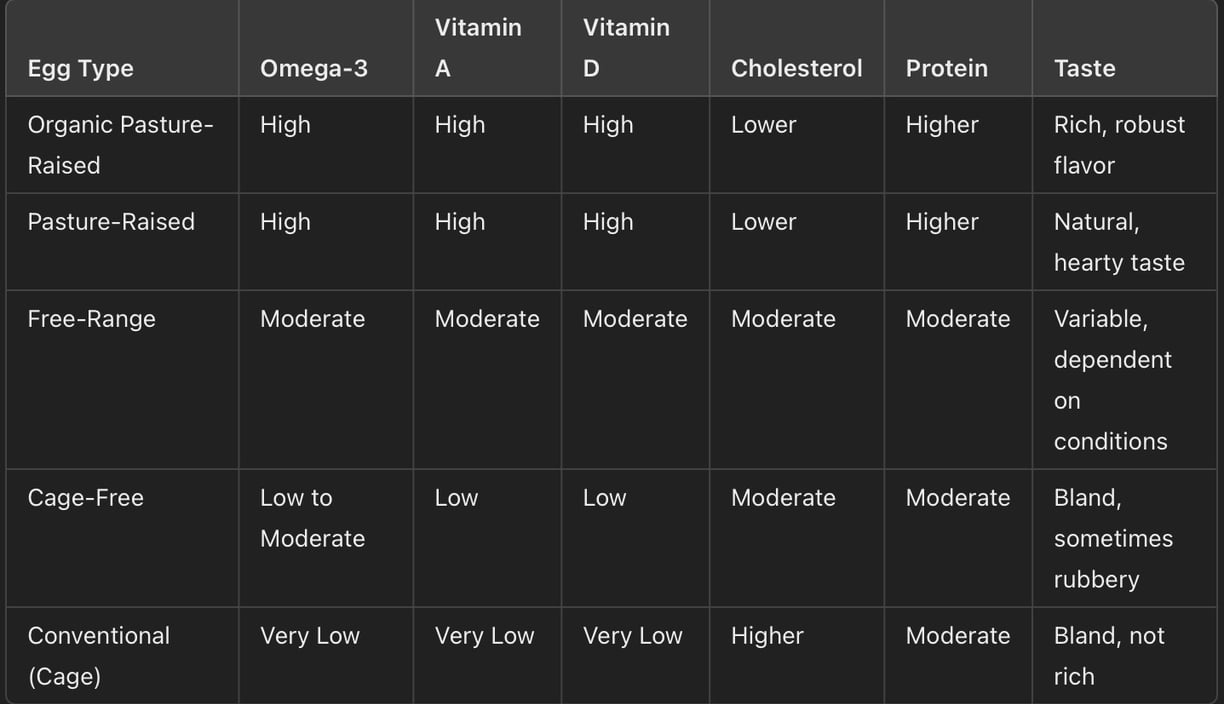
Egg Comparison
Discover the differences between organic pasture-raised, cage-free, and regular eggs for better nutrition and taste.


When comparing different types of eggs, there are several factors to consider: the hens' living conditions, their diet, and how these factors influence both the eggs' nutritional content and their overall quality. Here's a breakdown of the different egg labels, along with their potential nutritional differences:
1. Organic Pasture-Raised Eggs
Hen Living Conditions: These hens are raised in open fields with access to pasture, allowing them to roam, forage, and eat a more natural diet of grasses, seeds, and insects. The term organic means that their feed is free of synthetic pesticides, herbicides, and genetically modified organisms (GMOs).
Diet: Organic pasture-raised hens often eat a combination of organic grains and whatever they can forage from the pasture. This is considered the most natural and healthiest diet for hens.
Nutritional Profile:
Higher levels of omega-3 fatty acids compared to conventional eggs (due to their pasture diet).
Increased levels of vitamins A and E, as well as beta-carotene.
More vitamin D due to sun exposure.
Lower levels of cholesterol and higher-quality protein than conventional eggs.
Taste: These eggs are often considered to have richer flavor and firmer yolks.
2. Pasture-Raised Eggs
Hen Living Conditions: Like organic pasture-raised eggs, these hens are given significant outdoor space to roam. However, they are not necessarily fed organic feed—just high-quality, non-GMO feed and pasture foraging.
Diet: Their diet includes pasture forage and supplemented grains that may or may not be organic.
Nutritional Profile:
Similar to organic pasture-raised eggs but slightly lower in omega-3s and vitamins A and D if the diet is not as rich in those nutrients.
Generally higher in nutrients than cage-free or conventional eggs.
Taste: Often noted for having a strong, more natural taste compared to conventionally raised eggs.
3. Free-Range Eggs
Hen Living Conditions: These hens are given some outdoor access, but the amount of time they spend outside and the quality of the outdoor environment can vary greatly. In commercial settings, free-range hens may still be confined to crowded areas with limited outdoor access.
Diet: Hens are fed a conventional diet of grains, and they may forage outside if the conditions allow. However, they generally receive less outdoor time than pasture-raised hens.
Nutritional Profile:
Lower in omega-3 fatty acids and vitamin D than pasture-raised or organic eggs.
Higher than conventional or cage-free eggs in some nutrients, such as vitamin A and E, but typically lower in quality than pasture-raised eggs.
Taste: Taste can vary widely depending on the level of outdoor access and the diet of the hens.
4. Cage-Free Eggs
Hen Living Conditions: These hens are not kept in cages but are still typically confined to indoor barns or sheds. They have more space to move than caged hens but do not necessarily have access to the outdoors.
Diet: Hens are usually fed a conventional diet of grains, though they may have access to more varied foods than caged hens.
Nutritional Profile:
Higher in omega-3s and some vitamins compared to caged eggs, but the levels are generally lower than free-range or pasture-raised eggs.
May have slightly lower cholesterol than conventional eggs, but not as nutritionally dense as free-range or pasture-raised eggs.
Taste: Taste can be bland compared to eggs from hens that have access to outdoor pasture.
5. Cage-Free Eggs (Conventional, Non-Organic)
Hen Living Conditions: These hens are kept indoors with no cages but are often confined to crowded conditions with little or no outdoor access. They are typically fed commercial feed that may include antibiotics or synthetic additives.
Diet: Hens are usually fed a grain-based diet that can include soy, corn, and possibly non-organic feed with additives.
Nutritional Profile:
These eggs are lower in omega-3 fatty acids and may have higher cholesterol levels compared to pasture-raised or free-range eggs.
Nutritional content is lower overall in comparison to eggs from hens with better living conditions.
Taste: Typically less flavorful than eggs from hens raised in better conditions.
6. Regular Eggs (Conventional or Battery-Cage Eggs)
Hen Living Conditions: These hens are kept in small, overcrowded cages where they cannot move, spread their wings, or engage in natural behaviors. They are typically not given access to the outdoors.
Diet: Hens are fed low-cost commercial feed, often including soy, corn, and grains, which may contain antibiotics and synthetic additives.
Nutritional Profile:
These eggs tend to be lower in nutrients overall, with lower levels of omega-3s, vitamins A, D, and E, and antioxidants.
Higher in cholesterol and fats compared to eggs from hens with better living conditions.
Taste: The taste is often considered bland and less rich compared to eggs from hens that have better diets and more outdoor access.
Summary of Nutritional Differences


When comparing different types of eggs, there are several factors to consider: the hens' living conditions, their diet, and how these factors influence both the eggs' nutritional content and their overall quality. Here's a breakdown of the different egg labels, along with their potential nutritional differences:
1. Organic Pasture-Raised Eggs
Hen Living Conditions: These hens are raised in open fields with access to pasture, allowing them to roam, forage, and eat a more natural diet of grasses, seeds, and insects. The term organic means that their feed is free of synthetic pesticides, herbicides, and genetically modified organisms (GMOs).
Diet: Organic pasture-raised hens often eat a combination of organic grains and whatever they can forage from the pasture. This is considered the most natural and healthiest diet for hens.
Nutritional Profile:
Higher levels of omega-3 fatty acids compared to conventional eggs (due to their pasture diet).
Increased levels of vitamins A and E, as well as beta-carotene.
More vitamin D due to sun exposure.
Lower levels of cholesterol and higher-quality protein than conventional eggs.
Taste: These eggs are often considered to have richer flavor and firmer yolks.
2. Pasture-Raised Eggs
Hen Living Conditions: Like organic pasture-raised eggs, these hens are given significant outdoor space to roam. However, they are not necessarily fed organic feed—just high-quality, non-GMO feed and pasture foraging.
Diet: Their diet includes pasture forage and supplemented grains that may or may not be organic.
Nutritional Profile:
Similar to organic pasture-raised eggs but slightly lower in omega-3s and vitamins A and D if the diet is not as rich in those nutrients.
Generally higher in nutrients than cage-free or conventional eggs.
Taste: Often noted for having a strong, more natural taste compared to conventionally raised eggs.
3. Free-Range Eggs
Hen Living Conditions: These hens are given some outdoor access, but the amount of time they spend outside and the quality of the outdoor environment can vary greatly. In commercial settings, free-range hens may still be confined to crowded areas with limited outdoor access.
Diet: Hens are fed a conventional diet of grains, and they may forage outside if the conditions allow. However, they generally receive less outdoor time than pasture-raised hens.
Nutritional Profile:
Lower in omega-3 fatty acids and vitamin D than pasture-raised or organic eggs.
Higher than conventional or cage-free eggs in some nutrients, such as vitamin A and E, but typically lower in quality than pasture-raised eggs.
Taste: Taste can vary widely depending on the level of outdoor access and the diet of the hens.
4. Cage-Free Eggs
Hen Living Conditions: These hens are not kept in cages but are still typically confined to indoor barns or sheds. They have more space to move than caged hens but do not necessarily have access to the outdoors.
Diet: Hens are usually fed a conventional diet of grains, though they may have access to more varied foods than caged hens.
Nutritional Profile:
Higher in omega-3s and some vitamins compared to caged eggs, but the levels are generally lower than free-range or pasture-raised eggs.
May have slightly lower cholesterol than conventional eggs, but not as nutritionally dense as free-range or pasture-raised eggs.
Taste: Taste can be bland compared to eggs from hens that have access to outdoor pasture.
5. Cage-Free Eggs (Conventional, Non-Organic)
Hen Living Conditions: These hens are kept indoors with no cages but are often confined to crowded conditions with little or no outdoor access. They are typically fed commercial feed that may include antibiotics or synthetic additives.
Diet: Hens are usually fed a grain-based diet that can include soy, corn, and possibly non-organic feed with additives.
Nutritional Profile:
These eggs are lower in omega-3 fatty acids and may have higher cholesterol levels compared to pasture-raised or free-range eggs.
Nutritional content is lower overall in comparison to eggs from hens with better living conditions.
Taste: Typically less flavorful than eggs from hens raised in better conditions.
6. Regular Eggs (Conventional or Battery-Cage Eggs)
Hen Living Conditions: These hens are kept in small, overcrowded cages where they cannot move, spread their wings, or engage in natural behaviors. They are typically not given access to the outdoors.
Diet: Hens are fed low-cost commercial feed, often including soy, corn, and grains, which may contain antibiotics and synthetic additives.
Nutritional Profile:
These eggs tend to be lower in nutrients overall, with lower levels of omega-3s, vitamins A, D, and E, and antioxidants.
Higher in cholesterol and fats compared to eggs from hens with better living conditions.
Taste: The taste is often considered bland and less rich compared to eggs from hens that have better diets and more outdoor access.
Summary of Nutritional Differences
Egg Quality Comparison
Explore the nutritional differences between organic pasture-raised, cage-free, and regular supermarket eggs.
The difference in taste and nutrition between organic pasture-raised eggs and regular supermarket eggs is remarkable. I feel healthier and more satisfied with my choice!
Emily R.

★★★★★
